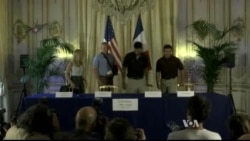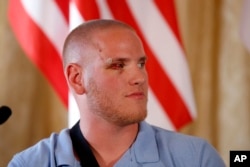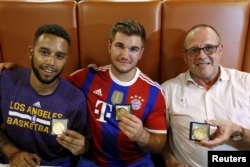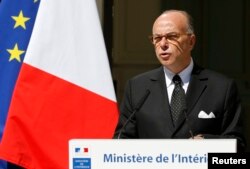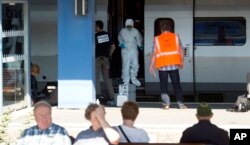French President Francois Hollande on Monday will bestow France's highest decoration, the Legion of Honor, on three Americans and a Briton who subdued a heavily armed gunman aboard a high-speed train on Friday.
The ceremony set for Monday morning in Paris also will include a French citizen who first discovered the gunman near a restroom as the train sped toward Paris. The event is expected to cap two days of near non-stop reporting on an intervention that French officials and anti-terror experts say in all likelihood averted a bloodbath.
Speaking for the first time Sunday, one of the three Americans who overpowered a heavily armed gunman on a high-speed train traveling between Amsterdam and Paris said he thought of his survival, as well as that of everyone else on train, when he tackled the gunman.
Spencer Stone, who was injured in the attack, and fellow Americans Alek Skarlatos and Anthony Sadler spoke to the press from the U.S. Embassy in Paris, describing the rough and tumble takedown of the suspect Friday.
“I feel our training mostly kicked in after the assailant was subdued, frankly," Skarlatos said. "When it came to medical care and things like that, and providing security and making sure there wasn’t another shooter. But in the beginning, it was mostly gut instinct.”
Stone said he awoke from a nap to see a man struggling with an assault rifle. It "looked like it was jammed and not working," he recounted.
After charging the gunman, a 26-year-old radical Islamist identified by officials as Ayoub El-Khazzani, the three Americans fought with the man until Stone was able to choke him unconscious.
Nobody died in the attack. Skarlatos suggested Khazzani had little experience handling weapons.
“He clearly had no firearms training whatsoever, and yes, if he knew what he was doing — or even just got lucky and did the right thing — he would have been able to operrate through all eight of those magazines and we would have all been in trouble and probably wouldn’t be here today, along with a lot of other people," Skarlatos said.
Stone said he thought about "survival, to survive and for everyone on the train to make it."
All three men said the event seemed "unreal."
Stone said what happened Friday hasn't really sunk in yet. "It feels very unreal, feels like a dream."
French investigators continue to question Khazzani, who is believed to have links to radical Islam and may have travelled to Syria. On Sunday, his lawyer told French TV the assailant is shocked to be linked to terrorism. She says he claims to have found the weapons hidden away and hoped to use them to rob passengers.
French President Francois Hollande thanked U.S. President Barack Obama by telephone Saturday for the "exemplary" actions of U.S. servicemen Skarletos and Stone, saying they stopped what would have been "an extremely serious attack."
Hollande said he plans to meet personally in "the coming days" with all of those involved in overcoming the would-be attacker.
Skarletos, Stone and American student Sadler were joined by Briton Chris Norman in subduing the Moroccan-born gunman, who seriously wounded at least one passenger before he was swarmed.
Injured in attack
U.S. Air Force Airman Stone was hospitalized with serious injuries, after being slashed in the neck and hand by the attacker with a box cutter.
Stone wore a sling on his left arm during the news conference and said he would receive further medical care in Germany.
The White House said Obama spoke Saturday by phone with Stone to wish him a speedy recovery and to extend the gratitude of all Americans for his "extraordinary bravery" aboard the train.
Spanish authorities identified the suspect, Khazzani, who spent time in Syria during the past year. He boarded the train in Brussels shortly before the attack Friday.
Authorities in France can hold him for questioning for four days without being charged. His lawyer maintains that Khazzani is "dumbfounded" by the terrorism allegations and only intended to rob passengers.
Attack
Briton Chris Norman, who lives in France, said the gunman walked into his railway car carrying a Kalashnikov assault rifle, a handgun and a box-cutter knife.
Norman, a grandfather who works on financing for African business projects, spoke Saturday to reporters in Arras, France, where the train stopped after the attack. He said his first instinct was to duck for cover when the gunman began shouting at the train passengers.
"Then I heard one of the Americans shout 'Go get him!' and the other said something like, 'Don't you do that, buddy!' and they charged him," Norman said.
Skarletos said, “Spencer ran a good 10 meters to get to the guy and we didn’t know his gun wasn’t working or anything like that.
"Spencer just ran anyway. And if anybody would have gotten shot, it would have been Spencer for sure. And we’re very lucky that nobody got killed, especially Spencer," he added.
In reconstructing the faceoff, authorities found the gunman had already shot one person in an adjacent car before entering the compartment where Norman and the Americans were seated.
When the Americans charged, Norman recalled thinking "I'm probably going to die anyway, so let's go."
He said he decided to "try to act as a team" with the two American servicemen and the student.
'Quite a battle'
He said the attacker "put up quite a battle."
"I helped hold his arms," Norman said, and the Americans hog-tied the Moroccan – tying his wrists behind his back and lashing them to his ankles, using the Briton's necktie.
French Interior Minister Bernard Cazeneuve applauded the quick action, saying it likely averted a bloodbath.
"Without their courage, we would have surely faced a terrible tragedy," Cazeneuve said. French authorities have been on high alert since Islamic militants killed 17 people in and around Paris in January.
Sadler, the American student who helped rush the attacker, is a friend of the two U.S. servicemen.
"I'm just a college student, it's my last year in college," he said. "I came to see my friends on my first trip in Europe and we stopped a terrorist. It's kind of crazy!"
The attack took place Friday, as the train sped through Belgium with 554 people on board. After the incident, the train was diverted to Arras in northern France.
VOA's Lisa Bryant contributed to this report from Paris.




